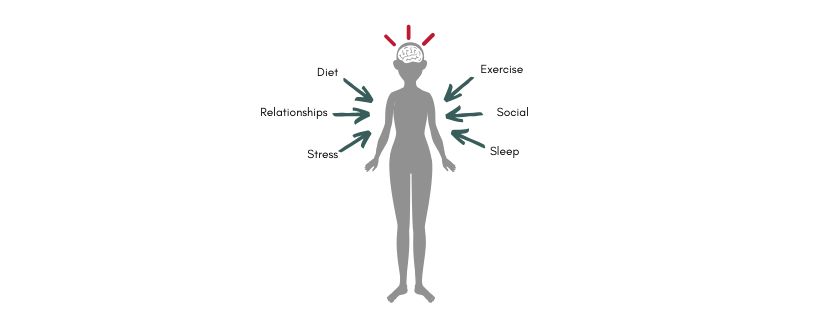|
Are you having a heart attack, or are you having an anxiety attack? Do you need someone to lie on your chest just so you have a reason to feel like you can’t breathe? Are you upset because your trigger is irrational, and you know it? Has anything helped with managing your condition? Our bodies are complex, and our brains are even harder to understand. Addressing aspects of anxiety with nutrition is tricky because many of the studies have been done on mice, and a day in the life of a mouse is considerably different from a day in your life. But here’s what we do know: anxiety is impacted by social, environmental, and biological factors, which means we need to address all three to improve the severity and frequency of the condition. First, therapy is a must; you won’t just be talking about your problems and what keeps you up at night, but you’ll walk away being able to trial different coping mechanism. You need to know that there are multiple methods of addressing anxiety, so if one doesn’t work for you, go back. There may be other methods you can try, or you might just need a little more practice implementing some strategies. The same thing goes for nutrition: it takes time, and you may have to address multiple problems before you can find solace. As we go through how nutrition impacts anxiety and vice versa, it’s important to keep in mind that you NEED to work through this one-on-one with a nutrition professional. This is not the sort of thing that you can do on your own. The purpose of this post is to show that nutrition does play a role in anxiety, but you need to work with someone to address your specific needs and assess NECESSARY lab work. Honestly, it’s way too complicated to outline in a mere blog post, so here we go! Overall, mechanisms that contribute to anxiety aren’t well understood, which makes the research hard to interpret. In some studies, we may see that a nutrient causes anxiety levels to go down, but we don’t know why. This makes it really hard to determine if a method of anxiety management is worth it. Additionally, statistical significance (what we look for to determine if an intervention has an impact) does not mean clinical significance (a judgment call on what will actually help people in real life). Without clinical significance, we may see markers for anxiety decrease, but you may not physically feel that your anxiety has decreased. This makes treatment for anxiety, especially nutrition interventions, a process of trial and error. Anxiety is caused by a hyperactive HPA-axis, or a pathway that connects our brain to hormone-signaling organs and regulates the stress hormones in our bodies. Glutamate is the major neurotransmitter that stimulates the HPA-axis whereas GABA suppresses the HPA-axis. Therefore, GABA supplementation can possibly reduce anxiety (but ask your doctor first). You can also find GABA in fermented foods, but from the research, it’s difficult to tell if it has a significant effect on HPA-axis activity. However, fermented foods are good for our gut, so it may be worth it regardless! Even though glutamate simulates HPA-axis activity, there are many reasons that the axis is over-stimulated or not turning off, including not having enough of specific nutrients to suppress the pathway. Zinc and magnesium are two nutrient deficiencies that may contribute to anxiety. Both nutrients act to regulate the HPA axis, which means if we are deficient in either of these nutrients, our susceptibility to anxiety is much higher. It is estimated that roughly one-half of the population does not consume enough magnesium, and a large portion of the population is at risk for zinc deficiency. Vegetarians fall into this category, and due to an increased number of people following this eating pattern, it’s important to ensure that we consume adequate quantities of zinc and magnesium. In combating anxiety, evidence also shows a therapeutic use for omega-3’s. Omega-3’s are all the rage right now; from heart disease to brain health, they seem to be a cure-all. Omega-3’s are one of the most studied nutrients when it comes to anxiety. They play a huge role in reducing systemic inflammation in the body. However, the ratio of omega-6’s to omega-3’s is what’s important. The standard American diet is super high in omega-6’s (read some labels and tell me how many of the products use corn and soy oil!). The ratio of omega-6 to 3’s in most American diets in ~20:1, and the goal ratio is 4:1 or less (ideally 1:1, so you’ll be limiting a lot of processed foods). Omega-6’s are inflammatory; however, some are also necessary. By increasing omega-3’s and decreasing omega-6’s, we can make sure all our bodies’ needs are being met. We do know that omega-3’s play a role in reducing inflammation and improving neurotransmission, but we still don’t know exactly how omega-3’s reduce anxiety although preliminary research is promising. Highlighting omega-3 content in foods is common with the growing popularity of the fatty acid; however, there are different kinds of omega-3’s, and they play different roles in the body. EPA/DHA are the kind of omega-3s that have a large role in reducing inflammation, and you can only get these from animal, mainly marine (fish), sources. ALA is the other type of omega-3 and is one of two essential fatty acids. ALA is the omega-3 found in plants, which is important but it is not readily converted to EPA/DHA (only ~1%, depending on your genetics). So if you’re looking to get in a hearty dose of the god-like omegas then you’ll need to make sure you are consuming a variety of omega-3 sources (plants and fish). Anxiety is a multifactorial condition where proper nutrition is a contributing factor to severity and frequency. Other lifestyle factors may also aid in anxiety control, such as high quality sleep and stress management, both of which also impact systemic inflammation. Of course, there are medications you can take, but at the end of the day, anxiety is a condition that requires treating the root causes of exacerbation and addressing triggers. If anxiety is something you suffer from, I recommend that you meet with professionals to fully explore the root cause. Although many people seek guidance from a psychiatrist or therapist, nutrition is often overlooked yet could play a major role in anxiety management!
Are there any foods or activities that help you manage anxiety?
1 Comment
|


